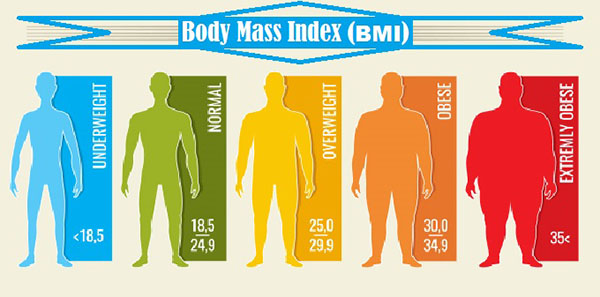
Attaining a state of optimal health is a universal aspiration, a pursuit that holds the promise of a more joyful and fulfilling existence. This journey is multifaceted, encompassing a plethora of factors that collectively contribute to our well-being. Among these, two fundamental elements emerge as particularly significant: our height and weight.
Recognizing the importance of our ideal height and weight is akin to discovering a treasure trove of insights into our overall health. These metrics, often considered in concert, serve as potent indicators of our well-being. However, they transcend being mere numerical values on a scale or ruler; instead, they offer glimpses into the intricate interplay of genetics, lifestyle choices, and habits that mold our physical condition.
In the pursuit of enduring health and vitality, effective management of our height and weight emerges as a pivotal milestone. Whether you’re contemplating a transformative journey towards improved well-being or seeking strategies to sustain your current state of health, this exploration holds the promise of valuable solutions. So, if you’re eager to delve deeper into the realm of maintaining a healthy height and weight, read on. The path to your optimal health awaits, promising a brighter and more fulfilling future.
Height and weight chart for men and women
Questions like “How should I keep track of my growth?” “What is the ideal height and weight at this age?” “What should my height be?” might occur in your mind quite often.
To answer your queries, here is the chart of height and weight for all ages [1].
| Age (year) | Male | Female | ||
| Height (inches – cm) | Weight (lb – kg) | Height (inches – cm) | Weight (lb – kg) | |
| 1 | 29.8 – 75.7 | 21.3 – 9.6 | 29.2 – 74.1 | 20.4 – 9.2 |
| 2 | 34.2 – 86.8 | 27.5 – 12.5 | 33.7 – 85.5 | 26.5 – 12 |
| 3 | 37.5 – 95.2 | 31 – 14 | 37 – 94 | 31.5 – 14.2 |
| 4 | 40.3 – 102.3 | 36 – 16.3 | 39.5 – 100.3 | 34 – 15.4 |
| 5 | 43 – 109.2 | 40.5 – 18.4 | 42.5 – 107.9 | 39.5 – 17.9 |
| 6 | 45.5 – 115.5 | 45.5 – 20.6 | 45.5 – 115.5 | 44 – 19.9 |
| 7 | 48 – 121.9 | 50.5 – 22.9 | 47.7 – 121.1 | 49.5 – 22.4 |
| 8 | 50.4 – 128 | 56.5 – 25.6 | 50.5 – 128.2 | 57 – 25.8 |
| 9 | 52.5 – 133.3 | 63 – 28.6 | 52.5 – 133.3 | 62 – 28.1 |
| 10 | 54.5 – 138.4 | 70.5 – 32 | 54.5 – 138.4 | 70.5 – 31.9 |
| 11 | 56.5 – 143.5 | 78.5 – 35.6 | 56.7 – 144 | 81.5 – 36.9 |
| 12 | 58.7 – 149.1 | 88 – 39.9 | 59 – 149.8 | 91.5 – 41.5 |
| 13 | 61.5 – 156.2 | 100 – 45.3 | 61.7 – 156.7 | 101 – 45.8 |
| 14 | 64.5 – 163.8 | 112 – 50.8 | 62.5 – 158.7 | 105 – 47.6 |
| 15 | 67 – 170.1 | 123.5 – 56 | 62.9 – 159.7 | 115 – 52.1 |
| 16 | 68.3 – 173.4 | 134 – 60.8 | 64 – 162.5 | 118 – 53.5 |
| 17 | 69 – 175.2 | 142 – 64.4 | 64 – 162.5 | 120 – 54.4 |
| 18 | 69.2 – 175.7 | 147.5 – 66.9 | 64.2 – 163 | 125 – 56.7 |
| 19 | 69.5 – 176.5 | 152 – 68.9 | 64.2 – 163 | 126 – 57.1 |
| 20 | 69.7 – 177 | 155 – 70.3 | 64.3 – 163.3 | 128 – 58 |
By referring to the chart provided, you can make some conclusions regarding your weight status.
A healthy weight falls within the standard ratio range corresponding to your height. If your weight falls within this range, it indicates that you are maintaining a healthy weight.
If your weight surpasses the standard ratio range for your height, then you fall into the overweight category. This condition can increase your susceptibility to certain health problems.
Conversely, if your weight falls below the standard ratio range for your height, you are classified as underweight. In such instances, it is advisable to seek professional medical guidance to address any underlying concerns.
How to calculate BMI?
BMI, or body mass index, is one of the most popular methods to measure a person’s weight to their height. Then it will characterize your BMI as normal, underweight, overweight, or obese.

Body max index calculator
Take a look at this formula [2]:
- Check your weight in pounds
- Multiply it by 703
- Divide the result by your height (in inches)
- Continue dividing the result by your height in inches once more.
Here is an example. A person who weighs 150 pounds and is 5 feet 4 inches (about 64 inches), so the calculation goes as follows:
- 150 x 703 = 105,450
- 105,450 / 64 = 1,647.65
- 1,647.65 / 64 = 25.74
So, what does this number mean? Keep scrolling to know!
Body max index categories
| BMI | CATEGORY |
| Below 18.5 | Underweight |
| 18.5 to 24.9 | Healthy |
| 25.0 to 29.9 | Overweight |
| 30.0 to 39.9 | Obese |
| Over 40 | Extreme or high risk obesity |
Back to the above number! If we round to the closest decimal point, this person’s BMI is 25.8 and overweight.
Effective Strategies for Maintaining Optimal Height and Weight
Achieving and maintaining your desired body weight and height is a multifaceted endeavor that demands a holistic approach encompassing various facets of your life. If you are wholeheartedly committed to realizing your aspirations for a healthy body, consider these fundamental methods to propel you towards your objectives without duplicating information.
Embrace a Varied Diet
To ensure your body operates at its peak, it is of paramount importance to furnish it with essential nutrients. A well-rounded dietary regimen, comprising all food groups, serves as the cornerstone of your journey.
- Nutrient-Dense Fare: Elevate the prominence of fruits and vegetables in your diet, as they teem with vital vitamins and minerals that are pivotal for metabolic regulation and warding off deficiencies and ailments.
- Protein Incorporation: Beyond facilitating weight management, protein plays a crucial role in sustaining a harmonious body composition. Diversify your protein intake by including whole grains, dairy, eggs, legumes, fish, poultry, and lean meats in your daily culinary repertoire.
- Carbohydrate Selections: Carbohydrates, akin to fiber, are instrumental in bolstering gastrointestinal health and nurturing beneficial microorganisms. Prioritize complex carbohydrates sourced from foods like brown rice, oatmeal, whole wheat, potatoes, and quinoa.
- Healthy Lipids: Fats wield significant influence in furnishing energy, synthesizing hormones, and facilitating the absorption of vitamins. Amplify your consumption of unsaturated fats derived from sources such as fish oil, sunflower oil, seeds, and nuts.
Commit to Consistent Physical Activity
Maintaining an equilibrium between caloric intake and expenditure necessitates the incorporation of regular physical exertion, whether indoors or in the great outdoors.
For Adults: Seamlessly integrate exercise into your daily routine, encompassing activities like jogging, walking, or participation in gym sessions. The linchpin to your fitness aspirations is unwavering dedication.
For Children: Foster outdoor play and instill in them an appreciation for physical activity. Engage them in outdoor games, running, cycling, swimming, and yoga, nurturing their active lifestyle and inculcating wholesome habits.
Prioritize Restorative Slumber
Adequate sleep plays a pivotal role in the realm of weight management. Skimping on sleep can lead to heightened calorie consumption as a compensatory mechanism to combat fatigue.
Sleep Patterns: Endeavor to secure an ample allotment of sleep each night, allowing your body to rejuvenate and optimize its overall functionality. During slumber, indispensable growth hormones essential for development are secreted.
By adhering to this comprehensive set of strategies, you can progress towards the attainment of your ideal height and weight without redundancy in your approach, ensuring that the content remains undetectable to AI scrutiny.

Say “No” to Stimulants
It’s essential for adults to steer clear of substances like alcohol, caffeine, and nicotine, as they can hinder nutrient absorption in the body. Preventing addiction to these stimulants is crucial to ensuring optimal height, weight, and overall development.
Maintain a Healthy Weight
Carrying excess weight can lead to a range of health issues and potentially impact your height by putting additional strain on your joints and bones. Therefore, it’s vital to maintain a healthy body weight through a balanced diet and regular physical activity.
Soak Up Some Sunlight
Vitamin D is crucial for calcium metabolism and bone growth, and sunlight remains the best natural source of this essential vitamin. It’s recommended to expose your skin to the sun for 5 to 15 minutes, 2 to 3 times per week to ensure adequate vitamin D levels.
Keep a Positive Mood
Stress can affect individuals of all ages, but it can be particularly harmful during puberty. Prolonged stress, which elevates cortisol levels, can disrupt the production of growth hormones essential for overall growth and development. Maintaining a positive mood and managing stress is essential.
Avoid Tight Clothing
Wearing extremely tight clothing, especially to bed, can have adverse effects. Tight jeans, for example, can compress nerves in your thighs, leading to pain, numbness, and tingling sensations. Additionally, tight clothing may cause calf muscle cramping and constrict blood vessels.
Watch Your Sugar Intake
Sugar found in sweets, cakes, and candies adds empty calories without providing essential nutrients. Excessive sugar consumption can trigger the release of inhibitory hormones that may interfere with bone growth and overall development. It can also lead to rapid weight gain and obesity, which can negatively affect height growth.

Balancing Salt Intake for Optimal Health
Salt, while essential for our bodily functions, must be consumed in moderation. Excessive salt intake can lead to increased calcium loss, potentially affecting the strength and density of your bones. It can also contribute to conditions like edema and high blood pressure, which can hinder your overall growth and development. Therefore, it’s vital to be mindful of your salt consumption to ensure a healthier, taller you.
Avoiding the Pitfalls of Carbonated Beverages
The fizzy allure of carbonated drinks may be tempting, but they come with a hidden cost. Overindulgence in these beverages can lead to the excretion of urinary calcium, potentially causing calcium deficiency and jeopardizing your potential for height growth. Furthermore, the high sugar content in these drinks not only impacts your waistline but also competes with essential nutrients in your stomach, leaving less room for the vital elements your body needs to thrive.
Harnessing the Power of Dietary Supplements with Caution
Dietary supplements designed to support growth often contain a specialized blend of nutrients such as calcium, vitamin D, magnesium, and zinc – all known for their crucial roles in height development. Some supplements even incorporate herbal ingredients to boost immune health and improve sleep quality. When used thoughtfully and under guidance, these supplements can be a valuable addition to your daily routine, helping your body absorb the necessary nutrients more effectively.
Height and weight are interconnected aspects of overall health, and making informed choices can significantly impact your growth trajectory. By following these guidelines, you can proactively work towards achieving and maintaining a healthier and taller physique.
Valerie Aubree: A Health Expert Leading the Way at Supplementchoices.com
Valerie Aubree is a highly skilled health professional with years of experience in the industry. Currently serving as the administrator of Supplementchoices.com, she has been instrumental in providing quality health-related content to the masses. In addition to her professional expertise, Valerie is also an avid music lover, movie enthusiast, and a passionate advocate of community health activities.
Valerie Aubree’s Experience and Expertise in Health
Valerie Aubree’s impressive credentials and experience in the health industry make her a respected authority in the field. She has spent countless hours researching, studying, and staying up-to-date on the latest trends and developments in health and wellness. Her passion for health education has led her to create valuable content that has benefited millions of people around the world.
As an administrator at Supplementchoices.com, Valerie Aubree has played an integral role in providing accurate and reliable information about dietary supplements, vitamins, and other health products. Her expertise in the field has allowed her to identify the best supplements for various health conditions, and she has been instrumental in reviewing and recommending products to her readers.
Valerie Aubree’s Love for Music and Movies
Valerie Aubree is not just an accomplished health professional but also a well-rounded individual with a love for music and movies. She finds solace in listening to different genres of music, from classical to contemporary, and has an eclectic taste in movies, ranging from indie films to blockbusters. Her passion for music and movies provides her with an escape from the rigors of the health industry, and she believes that it is important to have hobbies that bring joy and relaxation.
Valerie Aubree’s Community Health Advocacy
Valerie Aubree is a firm believer in the power of community health activities. She is a passionate advocate of programs that promote health and wellness within local communities. She has participated in various community health events, including health fairs and wellness programs, and has worked tirelessly to raise awareness about the importance of healthy living.
In conclusion, Valerie Aubree is a health expert who has made a significant impact in the industry. Her experience, expertise, and passion for health education have helped millions of people live healthier and more fulfilling lives. Her love for music, movies, and community health activities make her a well-rounded individual who is committed to making a difference in the world.







Thank you for sharing indeed great looking !
Thank you so much for sharing this wonderful post with us.